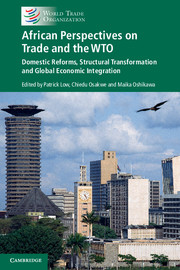 African Perspectives on Trade and the WTO
African Perspectives on Trade and the WTO from Part II - Africa’s Participation in the Rules-Based Multilateral Trading System
Published online by Cambridge University Press: 27 October 2016
Trade facilitation is central to Africa’s competitiveness in the global economy. Costs related to trade facilitation make up a significant proportion of overall trade-related costs, which in Africa are higher than in any other developing region. This acts as a barrier for the integration of African countries into global markets, as well as greater intra-African integration. Improving trade facilitation is essential for lowering costs for African agricultural producers as well as supporting the development of higher value-added activities in agribusiness, manufacturing, and services, including participation in regional and global value chains. Diagnostic tools used by the World Bank Group, such as the Logistics Performance Index, as well as country-specific diagnostics, highlight the key challenges faced. The evidence also shows that performance varies, with some countries making significant progress on reform programs to improve trade facilitation. With other developing regions having generally more advanced trade facilitation regimes, the lessons from these regions can be instructive in designing and implementing reforms in Africa, which the World Bank Group is actively supporting at the national and regional levels. A priority for the Bank Group is implementing trade facilitation programs that do more to reduce trade-related costs facing the extreme poor, given the concentration of extreme poverty in Africa.
To save this book to your Kindle, first ensure [email protected] is added to your Approved Personal Document E-mail List under your Personal Document Settings on the Manage Your Content and Devices page of your Amazon account. Then enter the ‘name’ part of your Kindle email address below. Find out more about saving to your Kindle.
Note you can select to save to either the @free.kindle.com or @kindle.com variations. ‘@free.kindle.com’ emails are free but can only be saved to your device when it is connected to wi-fi. ‘@kindle.com’ emails can be delivered even when you are not connected to wi-fi, but note that service fees apply.
Find out more about the Kindle Personal Document Service.
To save content items to your account, please confirm that you agree to abide by our usage policies. If this is the first time you use this feature, you will be asked to authorise Cambridge Core to connect with your account. Find out more about saving content to Dropbox.
To save content items to your account, please confirm that you agree to abide by our usage policies. If this is the first time you use this feature, you will be asked to authorise Cambridge Core to connect with your account. Find out more about saving content to Google Drive.